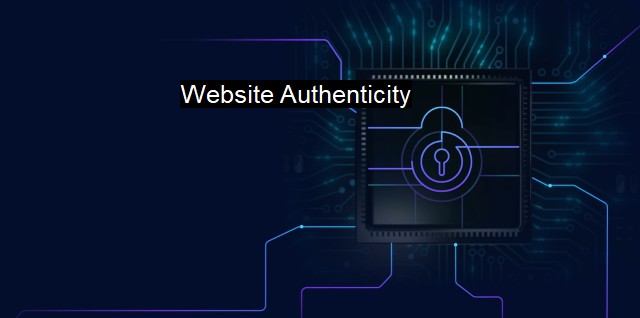What is Website Authenticity?
Ensuring Website Authenticity: Navigating the Risks and Challenges of Cybersecurity in the Global Marketplace
Website authenticity is a critical concept in the field of cybersecurity and antivirus solutions. It pertains to the validity and legitimacy of a website's domain and services. As fraudulent websites have become an increasing threat to internet users' privacy and security, ensuring website authenticity has become a crucial role in preventing cyber-attacks or breaches. Website authenticity goes beyond absolute security measures — it concerns with safeguarding users' online engagement with trustworthy websites emphasizing key factors like trust, identity, data protection, and secure transactions.Website authenticity is crucial for verifying the identity of a website. This identity verification is typically done using SSL certificates, a standard security technology that ensures data sent between web servers and browsers remains private. SSL certificates guarantee that the entity hosting the websites is exactly who they say they are, making it harder for cybercriminals to create fake websites, steal data, or launch cyber-attacks.
Relative to cybersecurity threats, counterfeit websites are often used for phishing attempts or to distribute malware, part of significant threats to online safety. Internet users need to configure that the websites they visit are authentic, especially when personal or sensitive data such as login credentials, bank details, or credit card information is involved.
Thus, most authentic websites rely on various tools and technologies to demonstrate their legitimacy to the user. A solid example is an HTTPS protocol, visible in the website URL, higher than HTTPS assures that communication is encrypted, adding another layer of reassurance for visitors. Another sign of an authentic website is the padlock symbol in the address bar, which again signifies a secure SSL connection indicating that the website takes the necessary steps to protect a user's data from unauthorized access.
Antivirus solutions also play an integral role in maintaining and verifying website authenticity. Many modern antivirus solutions integrate features designed to safeguard against visiting or downloading from potentially dangerous or fake websites. antivirus software can detect and eliminate rogue websites or potentially harmful downloads before they can cause significant levels of damage.
Website authenticity is not just about ensuring a secure connection or preventing malware attacks. It's also about maintaining a digital presence that fosters trust and confidence amongst users. Consequently, website authenticity includes ensuring true and correct information about the website operator, such as a comprehensive and transparent privacy policy, complete contact details, and clear terms and conditions. It reinforces the credibility of a website, enhancing user trust and intensifying customer loyalty.
Regardless, it's vital to remember that as technology evolves, so do cyber threats. Website authenticity is an ongoing process of ensuring that the security measures in place are updated to cover every potential threat. Regular updates to SSL certificates, firewalls, encryption methods, and other security protocols are a part of a proactive approach in safeguarding the legitimacy of any website.
Website authenticity is central to the efficient operation of the World Wide Web. With occurring cybersecurity threats, its importance has risen in the context of data protection, ensuring secure communication, and trust-building mechanisms. Authentic and secure websites contribute to safer cyber surroundings, helping users safely navigate the internet. Antivirus solutions and technological advancements continue to underscore their role in verifying website authenticity, thereby tightening cybersecurity measures and meeting the ever-evolving scope of cyber threats. Awareness and education around website authenticity offer more-than-needed support in wrestling against the growing risk of cybercrimes and securing an untroubled internet user experience.

Website Authenticity FAQs
What does website authenticity mean in cybersecurity?
Website authenticity in cybersecurity is the trustworthiness of a website in terms of its identity, security, and privacy. It refers to the genuineness of a website and its content, whether it has been verified and validated by an authoritative source or not.Why is website authenticity important in antivirus protection?
Website authenticity is vital in antivirus protection because it helps in identifying and blocking malicious websites that can harm your device, steal your data, or compromise your privacy. Antivirus software uses website authenticity as one of its criteria to determine which sites are safe and which ones are not.What are the common indicators of an authentic website?
Some common indicators of an authentic website include a valid SSL certificate, a recognizable domain name, clear contact information, and a trustworthy reputation. Authentic websites also provide relevant and up-to-date content, proper design, and easy navigation.How can I verify the authenticity of a website?
You can verify the authenticity of a website by checking its SSL certificate, the URL structure, and the website's trustworthiness score on tools like Google Safe Browsing or Norton Safe Web. You can also look for reviews, ratings, and feedback on the website's products or services. If in doubt, avoid visiting the website or consult with a cybersecurity expert.| | A | | | B | | | C | | | D | | | E | | | F | | | G | | | H | | | I | | | J | | | K | | | L | | | M | |
| | N | | | O | | | P | | | Q | | | R | | | S | | | T | | | U | | | V | | | W | | | X | | | Y | | | Z | |
| | 1 | | | 2 | | | 3 | | | 4 | | | 7 | | | 8 | | |||||||